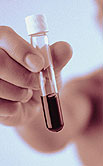 |
 |
 |

New Anti-Clotting Pill Works Well in Trials
It's easier to use and produces fewer blood clots, studies find|
|
HealthDay
Wednesday, June 25, 2008
 WEDNESDAY, June 25 (HealthDay News) -- A new anti-clotting drug that could be one of the long-sought alternatives to commonly used blood thinners has performed well in hip and knee replacement patients, physicians report.
WEDNESDAY, June 25 (HealthDay News) -- A new anti-clotting drug that could be one of the long-sought alternatives to commonly used blood thinners has performed well in hip and knee replacement patients, physicians report.
The drug, rivaroxaban, was more effective at reducing potentially fatal blood clots than heparin, with no increase in side effects, according to studies by three research teams reporting this week in the New England Journal of Medicine and The Lancet.
"It was superior to low molecular weight heparin, one of the two most common prophylaxis modalities in the United States," said Dr. William Geerts, a professor of medicine at the University of Toronto, and a member of a team that tested rivaroxaban after hip replacement surgery.
Prophylaxis in this case means prevention of blood clots. Heparin is commonly used in hospitals because it is easier to manage than Coumadin (warfarin), which requires frequent blood tests for close control. The new drug, rivaroxaban, is an easily swallowed pill that does not require constant monitoring.
In the international trial of 4,541 people who had hip surgery, 1.1 percent of those given rivaroxaban suffered problems such as deep-vein blockage or pulmonary embolism, compared to 3.7 percent of those given enoxaparin, a widely used form of heparin. The incidence of major bleeding was similar in both groups -- six of 2,209 for rivaroxaban, and two of 2,224 for enoxaparin.
In the knee replacement study, which included 2,531 patients, 9.6 percent of them given rivaroxaban experienced problems such as deep-vein thrombosis, compared to 18.9 percent of those who got enoxaparin.
The third study, done in England, followed 2,509 people who had hip replacement surgery for more than a month after they left the hospital. Only 2 percent of those taking rivaroxaban suffered problems during that time, compared to 9.3 percent of those getting daily injections of heparin.
All three studies were funded by Bayer, which plans to market the drug rivaroxaban as Xarelto. It already has competition from another anti-clotting drug known as dabigatran, which the pharmaceutical company Boehringer Ingelheim has permission to market in Europe and has approval to start marketing in Canada later this month, Geerts said. The brand name of that pill is Pradaxa.
The potential bigger market for both new anti-clotting drugs is for out-of-hospital use. An estimated 2 million Americans now take -- or are supposed to take -- Coumadin because of atrial fibrillation, the abnormal heartbeat that can cause formation of life-threatening blood clots, said Dr. Richard C. Becker, a professor of medicine at Duke University Medical Center, who co-wrote an accompanying editorial in the New England Journal of Medicine. Bayer is moving toward marketing rivaroxaban for those people, he said.
"These trials are part of a very large program," he said. "There are four large trials in orthopedic surgery and also large programs in atrial fibrillation. There are also programs for patients with acute coronary syndrome. In all, there will be close to 50,000 patients in randomized clinical trials."
Both new anti-clotting pills will be an improvement for many people now taking Coumadin, Geerts said. Because of the frequent testing required for Coumadin, many people who are told to take the medication don't follow instructions, he said. "This will likely translate to a larger proportion of people who should be on prophylaxis actually getting it," he said.
But the fact that frequent tests aren't required for the new anti-clotting agents is a challenge to physicians, Geerts said. Lab tests are proof-positive that someone is taking their medicine, he said. "As physicians, we have to think of new strategies to make sure people are compliant," he added.
HealthDay
Copyright (c) 2008 ScoutNews, LLC. All rights reserved.
Related News:
More News on this Date
Related MedlinePlus Pages:
| Home | Health Topics | Drugs & Supplements | Encyclopedia | Dictionary | News | Directories | Other Resources | |
| Disclaimers | Copyright | Privacy | Accessibility | Quality Guidelines U.S. National Library of Medicine, 8600 Rockville Pike, Bethesda, MD 20894 National Institutes of Health | Department of Health & Human Services |
Date last updated: 26 June 2008 |




